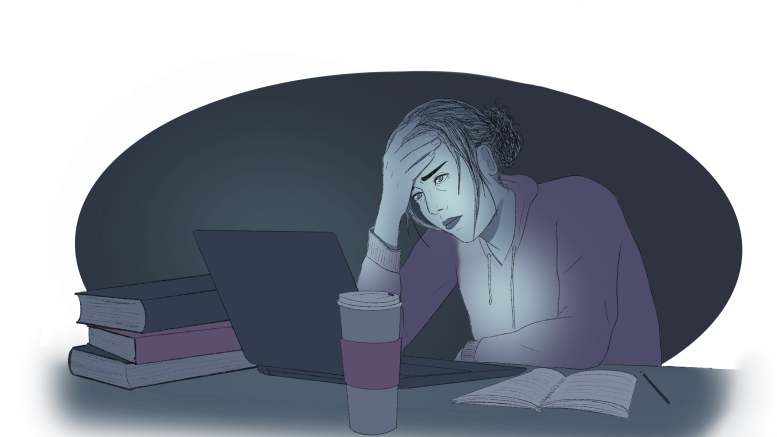Katie Surinx’s stress around midterm season can become physiological. Her third-year criminology coursework seems to have piled up and the stress of achieving good grades while working multiple jobs has become difficult to manage.
While researching the process of receiving mental health support through the university, Surinx learned that getting the initial intake session was a longer wait than she anticipated.
She thought, “well, what if this issue is over in a month?”
“But of course, the issue comes back when you have more exams or more stress in your life,” she said. “Stress doesn’t really go away naturally like that.”
The switch from online to in-person classes was difficult for Surinx, especially with new issues like transportation and a lack of easy access to professors.
In high school, “you have a bunch of friends, and you have a bunch of teachers and counsellors to talk to,” Surinx said. In university, however, she has had a very different experience.
“You have to do that all yourself, nothing is brought to you.
“You have to choose to make friends, you have to choose to ask for help.”
Gabrielle Ramsay’s experiences with fourth-year microbiology exams have been stressful since the pandemic.
Ramsay said, in her experience, many of her professors have not been very accommodating when it comes to rescheduling exams or allowing late submissions of assignments.
Ramsay found the transition to in-person classes difficult after two years of online school, and felt like she was in a “second first year,” having to re-learn the school’s structure and class formats.
David Ness, director of the Student Counselling Centre (SCC), said University of Manitoba students are able to come to the centre for psychological needs ranging from small stressors to serious and disruptive mental difficulties.
The demand and requests for services are always high throughout the academic year, according to Ness, but “last year was the most intense, high demand that we’ve ever experienced here at the U of M,” he said.
Ness said this demand was likely due to the transition from virtual to in-person coursework. Students preferred to visit a mental health professional in an office setting, and Ness said these factors led to a “back log” of students waiting for services.
He said the centre provides individual counselling, group sessions and outreach programs, such as a workshop in wellness and leadership. Workshops are also available to students, such as a stress and wellness 101 workshop series that students can use to learn techniques in relaxation methods.
Despite rumours, Ness clarified that counselling services through the SCC are free of charge to students. Both matters discussed during sessions and the fact that a student accessed support are kept confidential. The centre offers both remote and in-person services, and waitlists for counselling have not been “months long” in recent years.
While information is also available in different courses’ syllabi, Surinx made the point that students may not think they qualify.
“I think [resources] should be readily available for people who suffer from severe mental health [issues], or just regular stress, because everybody can be at risk for experiencing mental health problems,” she said.
Faculty of arts instructor Bryce Offenberger said he includes direct and indirect mental health information on his syllabi for students. Offenberger said he provides help and support to students talking to him about academics and personal issues.
“If they’re looking for some help, then goddammit, I am definitely going to be there for them.”
Offenberger said the heads of his department “always come by and make an active effort to check in, see how I’m doing and grab a coffee.”
Instructor Jae-Sung Chon from the faculty of architecture said instructors’ mental health is not as accommodated compared to students. Instead, instructors organize themselves to have weekly open conversations about their mental health.
“Our collective six, seven people are very open to conversation [with] each other,” Chon said. “That forum helps a lot of the stress points.”
Shanda Vitt, accessibility co-ordinator with student accessibility services (SAS), said the service was requested to be put on the syllabus as a way of spreading information. Vitt said SAS is accessible to students who have persistent or severe mental illnesses and disabilities, and registration in SAS has increased over the last year.
Vitt said staff are informed about the importance of accommodations and how they help reduce stigma and fear of repercussions for students.
“It’s not creating an unfair advantage, really, we’re equalling the playing field for the student,” she said.
UMSU president Tracy Karuhogo said UMSU offers students under the health and dental plan up to $1,250 for mental health services outside of the university, as well as access to the Empower Me app, which is available to students at any time.
Karuhogo said Empower Me can provide a variety of services and support for students in need.
“We know that so many students are just trying to find out what mental health resources they have, and UMSU’s job is just making sure that students can actually access [them],” she said.
Surinx said even though services like SAS and tutoring are available, students have the responsibility to seek them out. She thinks students would benefit if there was more awareness and information about these services, especially during exam season.
More support from the university for a student’s mental health and well-being is important to Surinx.
“A lot of people I know will call in sick days instead of mental health days because I don’t think the mental health day is seen as serious enough.”
Visit the Student Counselling Centre at 474 UMSU University Centre or call 204-474-8592 for more information. If you or someone you know is in an immediate crisis, the Klinic crisis hotline can be contacted at 204-786-8686.



